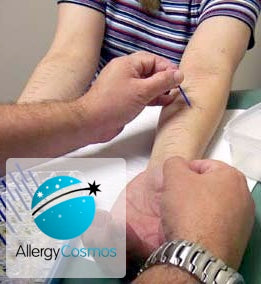Allergy testing gives allergy sufferers a better understanding as to what allergens may be triggering their allergy symptoms. You can find the answers to the five key questions for allergy testing below.
What is allergy testing?
During allergy testing, you are exposed to a suspect allergen to see whether or not your body produces an immune response to it.
How is allergy testing carried out?
There are three main types of allergy testing:
- Skin prick testing. This type of allergy testing is the most common. It has high accuracy for identifying an allergy to the most common of the airborne and food allergens. A droplet of purified liquid allergen is placed on the skin and then a tiny disposable needle makes a scratch in the drop, so as to introduce the allergen into the body. The testing is usually done on the forearm and it does not hurt. A positive reaction means that the skin around the prick becomes itchy and develops a white swelling (known as a wheal) within 20 minutes, fading within the hour. The doctor should ensure accuracy by using a negative control (water) and positive control (histamine, to which the skin will always produce a wheal). Up to 25 allergens can be tested in a single allergy skin prick session. A variation is the intradermal allergy testing, where the allergen is injected just beneath the skin.
- Patch allergy testing. The allergen is applied to a patch which is then placed on the skin. The patch, or patches, are left on the skin for 48 hours to pick up any delayed reactions. Patch allergy testing is also used to test for responses to irritants as well as true allergens.
- Blood allergy testing. A RAST (radioallergosorbent) test, or a more sensitive and specific version called the CAP-RAST test, measures the amount of Immunoglobulin E (IgE) antibodies produced in response to allergen exposure. The test, which is done in a specialist lab to which a sample of your blood is sent, produces results graded from 0 (negative) to 6 (strong positive). The presence of IgE is the hallmark of a true allergic response. Irritants cannot be tested for by the RAST test because they are not true allergens. There is also a blood test that measures histamine, rather than IgE, that is used in the diagnosis of certain types of nettle rash (urticaria). Another test (the Cellular Allergen Stimulation Test – CAST) measures levels of leukotrienes, a type of inflammatory chemical and is used to identify certain food allergens where the response does not involve IgE.
There is also The Allergen Provocation Testing for airborne allergens which are performed only in a hospital. The doctor introduces the suspect allergen directly into the nose, lung or eye to see if it induces a response.
What allergens can be tested for?
Patch allergy testing is available for most common allergens, like house dust mite or pet dander. Blood allergy testing can identify as many as 400 different allergens. With developments in protein analysis (allergens are proteins), it is likely that this number could be greatly expanded in the future.
Where can I get allergy testing done, and how much will it cost?
Ask your GP in the first instance for a referral to an allergy clinic. Not all NHS hospitals have an allergy clinic so you may need to travel/wait for an appointment. You can also get tests at a private allergy clinic, but be sure you are going to an accredited allergy specialist for this (check the British Society for Allergy & Clinical Immunology listings). Tests offered online or by alternative medicine clinics are not proven and are therefore not recommended at the current time. Tests on the NHS are free but you will have to pay at a private clinic.
What are the pros and cons of allergy testing?
Allergy testing is a useful tool where your allergy symptoms are severe and the cause is not obvious. But it cannot tell you how severe your response to that allergen will be in a 'real world' situation. The test is only part of the diagnostic process; your doctor should also take a full history of your exposures to the allergen and symptoms. And, of course, the test cannot cure your allergy – it can only guide you in practicing effective allergen avoidance and the management of your allergy symptoms. Very occasionally, allergy testing will provoke a severe allergic response. Seek medical help immediately if you experience symptoms such as swelling of the face, lips or mouth or difficulty in swallowing, rash, shortness of breath, wheezing or lightheadedness.




